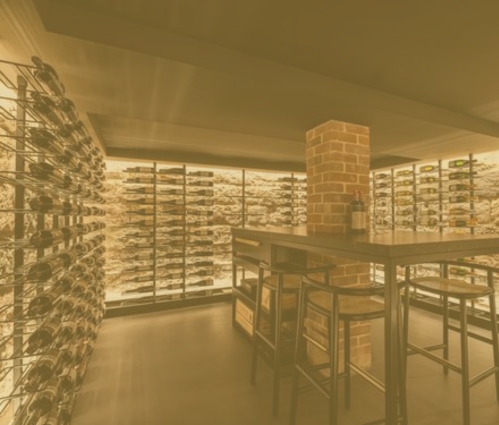- Storage is arguably the most important factor in preserving the quality of a fine wine and is thus fundamentally linked to its value as an investment.
- A well-documented history of storage and ownership can significantly increase a wine’s value, serving as proof of its authenticity and condition.
- Storing wine in-bond has multiple benefits, including deferred taxes, easier international trading and guaranteed provenance.
Wine storage has undergone significant transformation over the years, evolving from traditional cellars in private homes to sophisticated, climate-controlled facilities that cater to the needs of serious collectors and investors. The way wine is stored can greatly impact its quality, and by extension, its value as an investment.
Why is wine storage important
A large part of fine wine’s performance as an asset is down to its ability to improve as it ages. If the quality increases in time, so does its value.
Storage is arguably the most important factor in preserving the quality of a wine. If a bottle is stored improperly, the opposite can happen. Fluctuating temperatures, exposure to sunlight, vibrations and humidity can all degrade the quality of the wine and lead it to lose its value.
By storing your assets in professional dedicated wine storage facilities, you can guarantee that when the time comes to sell, it will be in the best possible condition. This will give the final consumer confidence that the wine is of the expected quality, defending its future value.
The evolution of wine storage solutions
Historically, wine storage was the domain of underground cellars, designed to provide the cool, stable temperatures and humidity levels that wine needs to age gracefully. These cellars, often part of private homes in wine-producing regions, set the standard for ideal wine storage conditions: darkness, consistent temperature around 12-14°C (55-57°F), and relative humidity around 60-70%.
In recent decades, technology has revolutionised wine storage. Climate-controlled wine cabinets and refrigeration units can replicate the conditions of a traditional cellar, making it possible to store wine in any environment. Innovations such as dual-zone temperature controls, UV-protected glass doors, and vibration reduction technology have further enhanced the ability to preserve wine at optimal conditions.
Moreover, professional wine storage facilities offer a level of sophistication and security beyond what most private cellars can provide. These facilities are equipped with state-of-the-art climate control systems, backup power sources to protect against outages, and high-security measures to guard against theft. They also offer inventory management services, ensuring that wines are stored properly and can be easily accessed or audited by their owners.
For investors, the use of such facilities can enhance the value of their collection, as provenance – the history of wine’s ownership and storage – becomes increasingly important in the secondary fine wine market.
The role of provenance in wine investment
Provenance is a critical factor in the wine investment market. A well-documented history of storage and ownership can significantly increase a wine’s value, serving as proof of its authenticity and condition. Professional storage facilities often provide detailed records that can be invaluable in establishing provenance, making wines stored in these conditions more desirable to collectors and investors alike.
In contrast, wines stored in private cellars may lack comprehensive records, potentially diminishing their market value, regardless of their quality or rarity.
In-bond storage
Bonded status is what unlocks the secondary market for fine wine.
Storing wine in-bond means that the wine is kept in a secure warehouse under government supervision without the payment of duty or tax. For wine investors, this presents a significant advantage, as it allows for the storage of wine without the financial burden of taxes until the wine is either sold or removed for personal consumption. Typically, wines can be stored in-bond at their point of entry into a country or transferred to a bonded warehouse specifically designated for wine storage. The wines stored in-bond are trade-ready; they sit within the secondary market ecosystem and can be made immediately available for sale and collection.
Implications for wine investment
The ability to store wine in-bond has several implications for investors.
Deferred taxes: Investors can defer tax payments, improving cash flow and reducing initial investment costs. This is particularly beneficial for wines intended for resale, as the duty and VAT (value-added tax) are only paid if and when the wine enters the domestic market.
International trading: In-bond storage facilitates easier trading of wine on an international scale. Wines can be bought and sold multiple times while still in-bond, without incurring tax liabilities until they are finally withdrawn for consumption. This can significantly enhance the liquidity of wine investments.
Provenance and condition: Bonded warehouses are not only secure but are also designed to provide optimal storage conditions, similar to professional wine storage facilities. The rigorous documentation and oversight in these warehouses ensure the provenance and condition of the wine, crucial factors in maintaining and enhancing its value.
Market value: Wines stored in-bond are often more attractive to buyers, especially in international markets. The assurance of proper storage conditions and the ease of transfer without immediate tax implications make these wines more desirable, potentially increasing their market value.
Storing wine with WineCap
WineCap use London City Bond’s newest storage facility, Drakelow. Three and a half miles of tunnels were blasted out of solid rock, as part of the lavish refurbishment of this former nuclear bunker, which started operating as a dedicated wine storage facility in 2023. Highly secure with entirely natural permanent temperature control supported by the latest dehumidification equipment, Drakelow is the natural choice for maturing reserves.
Every wine in our storage facility gets its own unique identification number (UIDS), thus ensuring that each case has clear ownership.
The practice of storing wine in-bond in bonded warehouses represents a critical aspect of the wine investment landscape. As the wine market continues to mature, the importance of professional storage and provenance documentation is likely to grow, influencing both the strategies of investors and the broader dynamics of wine collecting and investing. Whether opting for a meticulously maintained home cellar or entrusting a collection to a professional storage facility, understanding the impact of storage on wine’s quality and value is essential for any serious wine investor.
Speak to one of our wine investment experts and start building your portfolio. Schedule your free consultation today.


